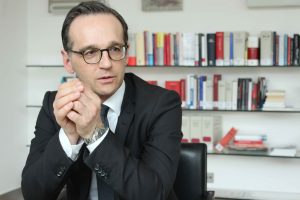“It is my dream that Jews in Germany will be able to live completely normal and ordinary lives”, says Federal Minister of Justice, Heiko Maas. In our exclusive interview, Maas also stresses the special Israeli-German relations. He explains the measures he is taking against hate crimes in social media and discloses what he has learnt as a triathlete when it comes to politics and life in general…

© JVG
The Social Democratic Party has a new star. How do you account for Martin Schulz’s success?
Martin Schulz speaks a language that people understand. And he’s focusing on the right issues – many issues that fall under the rubric of “social justice,” which has the SPD breathing a huge sigh of relief. His form of political engagement, and the way he speaks, gives people the sense that he’s listening to them, understands them, and is placing their concerns at the center of his political agenda.
What does Judaism mean to you?
Judaism, and especially Jewish Germany, has become an extremely important aspect of my life and my work. I first went into politics because I had grappled in a very intense way with Germany’s past.
During my years as a Federal Minister, I’ve visited Israel more often than any other country. Despite any political differences we may have, I collaborate closely with my Israeli counterpart, Ayelet Shaked, and we’ve been able to launch many projects together. Judaism is thus a very important aspect of my political work; wherever I can, I work toward the goal that is my dream, which is that Jews in Germany will be able to live completely normal and ordinary lives. I think it is shameful that their schools and synagogues still require police protection.
You recently presented the results of the Rosenburg Files study in Tel Aviv. Why didn’t this study of the history of the Federal Ministry of Justice get underway much earlier, for example under SPD Ministers of Justice Heinemann, Vogel, or Jahn…
That probably has something to do with the fact that until the early 1970s, many people in positions of leadership within the ministry were former Nazi Party members. But it’s never too late for justice to be served. It’s terrible that it took so long – but that makes it all the more important that we finally managed to undertake a thorough investigation of the topic.
Is the Israeli government willing to listen to criticism regarding the construction of settlements?
That’s often viewed as interfering in their domestic affairs. Ultimately, we shouldn’t be meddling in issues that are purely a matter of Israel’s domestic policy. But if we don’t want to lose sight of the ultimate goal, which is a two-state solution – a solution that might be made more difficult as a result of certain measures undertaken during settlement construction – I don’t regard this as meddling in Israel’s domestic policies. If we express objections, it’s important to strike the right note.
In a speech before the Knesset in March 2008, the German chancellor said Israel’s security is non-negotiable … Two years ago, this security was indirectly the subject of negotiations by the permanent members of the Security Council plus Germany. Israel, but also Saudi Arabia and Egypt, feel themselves under threat from Iran…
I understand the skepticism on the part of Israel with respect to this nuclear deal with Iran. But this agreement was not made by individual states; rather, it reflects what the majority of the international community regards as a sensible solution. We are convinced that Israel’s fears will not be realized – otherwise we would never have agreed to such a deal. Increasing Iran’s isolation would not have been a viable solution – not for Israel, either.
How is Germany helping to secure Israel’s existence?
Germany is an active partner when it comes to matters of Israel’s defense. We also want to help represent Israel’s interests in international associations and organizations. To the best of our ability, we wish to help Israel ensure that its people can live in safety
.
What is the biggest danger to German democracy today?
Extremists and populists; they have no affinity for the truth. They try to pit different groups of people against one another for political advantage. Citizens against non-citizens, citizens against citizens. That is paving the way to increasing divisions within our society. Ultimately, it could mean that conflicts and disagreements will no longer be negotiated in parliament, but battled out on the streets. All democratic forces must seek to counter this threat. Moreover, the actions of extremists cannot merely be countered in the political sphere; they are also a matter for the courts. Crimes committed in the name of extremism – against individuals as well as against the state – must be prosecuted to the fullest extent of the law.
What about hate speech online? You are stepping up pressure on online providers.
Unfortunately, hate crimes are not being sufficiently addressed and removed online. This is first of all a legal matter. Hate speech, threats, and slander are criminal acts, and they must be pursued to the fullest extent of the law. The internet is not outside the law. We also want social network providers to assume greater responsibility. Twitter removes only 1 percent of reported criminal content; Facebook removes 39 percent of such content. Google removes 90 percent of such content from YouTube, which demonstrates that we are not demanding the impossible. We have now decided to purpose legal measures: if an online provider fails to enact a functional complaint system, individual staff members could face fines up to €5 million, while the company could face fines up to €50 million.

© JVG
Right-wing populists in Poland and Hungary, Brexit … how can liberal Europe regain the upper hand?
Only with good arguments. I know this is difficult, particularly in our post-factual age. But we will not be able to solve any of the major challenges of our present day or the future, whether they be matters of environmental or climate policy, or problems that are economic, social or political in nature, purely on the level of the nation-state. This is even more the case when it comes to questions of migration. Otherwise we are doomed to fail. Even if it requires immense effort, even if we’re forced to talk until we’re blue in the face, I don’t believe there’s any alternative to international collaboration when it comes to tackling our current problems, which are all cross-border in nature.
What lessons have you learned as a triathlete when it comes to politics and to life in general?
That it’s worth it to never give up. To continue on your path, even if it’s sometimes painful. To keep going. And to stand up if you fall. The goal lies ahead of you somewhere – and it’s waiting for you. And when you arrive at your goal, it will be extremely satisfying.
What does power mean to you?
Power isn’t something to be exercised for its own sake. Power is what makes it possible to implement some of the things you believe in. Without power, that’s impossible. That’s why you need to have an enlightened attitude toward power. In the political sphere, claiming that you want nothing to do with power is nothing but a lie.
Heiko Maas spoke with JVG editors Elisabeth Neu and Rafael Seligmann at the Federal Ministry of Justice and Consumer Protection in Berlin
